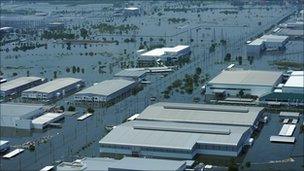Thailand floods disrupt production and supply chains
- Published

An industrial estate outside the ancient Thai capital Ayutthaya has seen some of the worst flooding
Factories and supply chains are facing disruption as some of the worst flooding in decades starts to affect Thailand's economy.
Western Digital, Honda Motor and many other companies have been forced to suspend production in central Thailand because of the floods.
Most of the factory closures are due to disruptions to local supply chains.
Two-thirds of Thailand is affected by the floods, and more than 280 people have lost their lives since July.
Besides Honda, other Japanese carmakers Toyota and Nissan are also experiencing disruption to their production.
Other companies are affected as well, with Sony closing its facility in Ayutthaya until at least Friday.
On Thursday, Seagate Technology said its production of hard drives would be affected in the current quarter because of supply chain disruptions. US chip-maker Western Digital also said the flooding could hurt production due to infrastructure problems.
Financial impact
Analysts said at this point the impact on most companies was limited, but it could get worse if the factories stay shut for longer.
"Thailand represents 4-8% of global capacity for any one company," said Kurt Sanger of Deutsche Securities in Tokyo.
"A month shutdown would not be overly damaging, but if we have an extended three months or so we could start talking about serious volume and financial impact."
Mr Sanger said most of the impact on factories had come because of disruption to supplies of parts.
Honda Motors seems one of the worst affected with flooding in one of its automobile factories. That and other vehicle production plants are shut until at least 14 October because of difficulties in getting parts.
The factories accounted for 4.7% of its global vehicle output in 2010.
A Honda spokesperson said the company was considering whether to send parts from other countries to help restore production.
Toyota's three factories are all shut until at least 17 October because of supply chain disruptions, a company spokesperson said.
'Not over yet'
However, the impact on individual companies stands to be dwarfed by the expected impact on Thailand's economy overall.
The finance ministry estimated the initial cost of damage to be 69bn baht ($2.2bn; £1.4bn). It also cut its economic growth forecast for this year to 3.7% from 4%.
"The damage is not over yet because we have to look at the continuity of economic activities," Kittirat Na Ranong, deputy prime minister, told the Reuters news agency.
"We need to wait until the situation eases, so there is still a chance of higher losses."
- Published11 October 2011
- Published11 October 2011